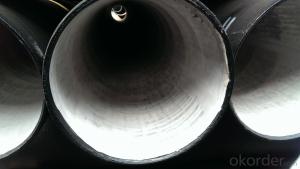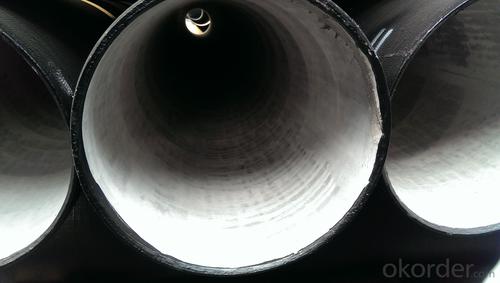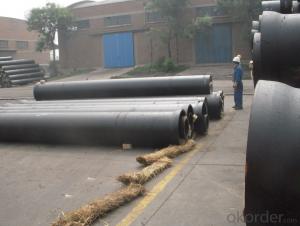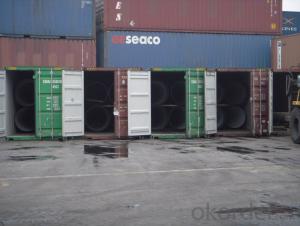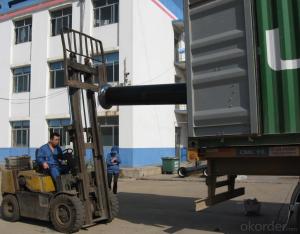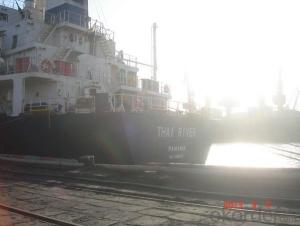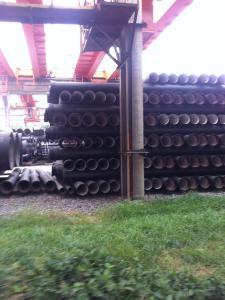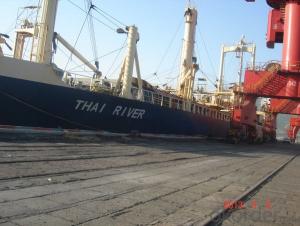DUCTILE IRON PIPES AND PIPE FITTINGS c40 CLASS DN450
- Loading Port:
- Tianjin
- Payment Terms:
- TT OR LC
- Min Order Qty:
- 25 m.t
- Supply Capability:
- 30000 m.t/month
OKorder Service Pledge
OKorder Financial Service
You Might Also Like
Material : Ductile Cast Iron
Size Range : DN 80mm to DN 2000mm
Unit Effective Length : 6m or 5.7m
Manufacture Standard: ISO 2531:1998/ EN 545:2006/EN 598:2007
Annual capacity : 200,000 tons
Coating Exterior: Zinc 130g/m2 according to ISO 8179-1 and bitumen coating 70 microns.
Cement Interior: Portland Cement/ High Alumina Cement/ Sulphate Resisting Cement Lining according to ISO 4179
Special requirements on external coating and internal lining can be applied
We also provide accessories such as SBR/EPDM rubber gaskets, lubricant paste, pipe caps, PE sleeves, etc.
Additional Parts:
Each pipe is strictly inspected according to related standard to ensure permanently high performance.
Easy Installation at site and service free for life
Long Service Lifespan
Quotation will arrive you within 24hours once we get your inquiry.
We guarantee offering you a competitive price.
A copy of original inspection reports of pipes will be offered after shipment.
Photos of loading process will be sent to the customer after shipment effect.
We will follow-up the delivery progress after shipment effect and update to the customer on weekly basis.
- Q: How does ductile iron pipe perform in extreme temperatures?
- Ductile iron pipe is renowned for its exceptional performance in extreme temperatures, thanks to its unique composition and manufacturing process. Its structural integrity remains uncompromised, allowing it to endure both high and low temperatures without issue. When it comes to high temperatures, ductile iron pipe showcases remarkable heat resistance. It can withstand temperatures of up to 1000 degrees Fahrenheit, making it perfect for applications involving hot liquids or gases, such as steam pipelines or industrial processes. Its strength and thermal stability enable it to maintain its shape and structural integrity even under extreme heat conditions, guaranteeing long-term reliability and safety. Similarly, ductile iron pipe excels in low-temperature environments. It can brave sub-zero temperatures without becoming brittle or prone to cracking, a common problem with materials like cast iron. This makes ductile iron pipe an ideal choice for applications in cold climates, such as water distribution systems in freezing temperatures. Moreover, the ability of ductile iron pipe to resist thermal expansion and contraction is another advantage in extreme temperatures. It has a low coefficient of thermal expansion, meaning it expands and contracts less compared to other materials. This property minimizes stress on the pipe, reducing the risk of leaks or failures caused by temperature fluctuations. In conclusion, ductile iron pipe demonstrates outstanding performance in extreme temperatures. Its heat resistance, ability to withstand low temperatures, and resistance to thermal expansion and contraction make it a reliable option for various applications, ensuring safe and efficient operations even in challenging environments.
- Q: Can ductile iron pipes be used in culvert or storm sewer applications?
- Yes, ductile iron pipes can definitely be used in culvert or storm sewer applications. Ductile iron pipes are known for their strength, durability, and flexibility, making them ideal for such applications. They have the ability to withstand heavy loads, resist corrosion, and handle high flow rates, making them a reliable choice for culverts and storm sewers. Ductile iron pipes also have a long service life and require minimal maintenance, further adding to their suitability for these applications. Additionally, ductile iron pipes can be easily installed and are available in various sizes and configurations to meet the specific requirements of culvert or storm sewer projects. Overall, ductile iron pipes are a proven and widely used option for culvert or storm sewer applications, providing efficient and long-lasting performance.
- Q: How does ductile iron pipe perform in seismic areas?
- Ductile iron pipe performs exceptionally well in seismic areas due to its inherent strength and flexibility. Seismic activity can subject pipelines to significant ground movements and vibrations, and ductile iron pipes have proven to be highly resilient in such conditions. The unique properties of ductile iron, including its high tensile strength and ductility, allow it to absorb the energy generated during seismic events. This ability to flex and bend without breaking or fracturing makes it an excellent choice for areas prone to earthquakes. Furthermore, ductile iron pipes are designed and manufactured to withstand external forces and ground movements. They are often installed with flexible joints that can accommodate ground shifts and maintain the integrity of the pipeline system. These joints can absorb lateral and angular movements, reducing the risk of pipe failure. Additionally, ductile iron pipes have a long history of successful performance in seismic areas. They have been extensively tested and proven to meet or exceed industry standards for seismic resistance. This reliability is crucial in ensuring the safety and functionality of water and wastewater systems, even in the event of a seismic event. Overall, ductile iron pipe is a reliable and durable choice for pipelines in seismic areas. Its ability to withstand ground movements, its flexibility, and its proven track record make it an excellent option for ensuring the integrity and functionality of water and wastewater systems in earthquake-prone regions.
- Q: Are ductile iron pipes suitable for use in mining tailings pipelines?
- Yes, ductile iron pipes are suitable for use in mining tailings pipelines. Ductile iron has excellent strength and durability properties, making it capable of withstanding the high pressure and abrasive nature of tailings. Furthermore, its corrosion resistance and ability to withstand harsh environmental conditions make it a reliable choice for mining applications.
- Q: What are the different joint types available for ductile iron pipe?
- There are several different joint types available for ductile iron pipe, each with its own advantages and applications. The most common joint types used in ductile iron pipe installations are: 1. Push-on Joint: This joint type is the most widely used and involves a rubber gasket that is placed into a groove on the spigot end of the pipe. The pipe is then pushed into the bell end of the adjoining pipe, creating a watertight seal. Push-on joints are quick and easy to install, making them ideal for applications that require a fast and efficient installation process. 2. Mechanical Joint: This joint type involves the use of a gland and follower gasket that is compressed between the spigot end of one pipe and the bell end of the adjoining pipe. A series of bolts and nuts are used to secure the joint, ensuring a tight and secure connection. Mechanical joints provide a high level of joint integrity and are often used in applications where higher pressures or heavy loads are expected. 3. Flanged Joint: Flanged joints involve the use of flanges on the ends of the pipes, which are then bolted together using gaskets to create a leak-proof connection. Flanged joints are commonly used in applications where the pipe needs to be easily disconnected and reconnected, such as in pump stations or at valve connections. 4. Restrained Joint: Restrained joints are designed to prevent the pipes from separating under high internal pressures or external forces. These joints typically include a mechanical joint with additional restraining devices such as harnesses, rods, or thrust blocks. Restrained joints are commonly used in applications where there is a risk of pipe movement or where stability is critical. It's important to note that the selection of joint type depends on various factors such as the application, operating conditions, and project requirements. Consulting with a professional engineer or pipe manufacturer is recommended to determine the most suitable joint type for a specific ductile iron pipe installation.
- Q: What are the different methods for restraining ductile iron pipe?
- There are several different methods for restraining ductile iron pipe. These methods are used to prevent movement or displacement of the pipe due to internal pressure, external forces, or ground movement. The most common methods for restraining ductile iron pipe include: 1. Thrust blocks: Thrust blocks are concrete blocks or structures that are placed against the pipe at bends, tees, or other changes in direction. These blocks are designed to resist the forces exerted by the flowing water or other fluids within the pipe, effectively anchoring the pipe in place. 2. Mechanical restraints: Mechanical restraints, such as harnesses or clamps, are devices that are installed around the pipe and attached to a fixed structure, such as a wall or a concrete anchor. These restraints provide a physical barrier that prevents the pipe from moving or shifting. 3. Pipe restraints: Pipe restraints are devices that are directly attached to the pipe and anchored to a fixed structure. These restraints can include pipe clamps, pipe restraints, or pipe saddles. They are designed to securely hold the pipe in place and resist any movement or displacement. 4. Pipe bedding and backfill: Proper pipe bedding and backfilling is important for restraining ductile iron pipe. The pipe must be properly supported and surrounded by compacted material to prevent movement or shifting. This method involves carefully placing and compacting soil or other suitable materials around the pipe to provide stability and prevent displacement. 5. Trench walls: The walls of the trench in which the ductile iron pipe is installed can also provide some level of restraint. By properly compacting the soil against the pipe and ensuring proper compaction and stability of the trench walls, the pipe can be effectively restrained and prevented from movement. Overall, the different methods for restraining ductile iron pipe aim to ensure the pipe remains securely in place and does not experience any displacement or movement. The choice of method depends on factors such as the location, application, and the forces acting on the pipe. It is important to consult with engineers and follow industry guidelines and standards to determine the most appropriate method for restraining ductile iron pipe in specific situations.
- Q: Can ductile iron pipes be used for conveying gases?
- Indeed, gases can be conveyed using ductile iron pipes. Ductile iron, renowned for its strength and durability, is capable of enduring high pressures and temperature fluctuations, rendering it appropriate for gas transportation. Furthermore, ductile iron pipes possess exceptional resistance to corrosion, a crucial attribute when handling potentially corrosive gases. Nevertheless, it is of utmost importance to verify the compatibility between the specific gas being conveyed and ductile iron, in order to avert any chemical reactions or pipe damage. To ensure the secure and efficient conveyance of gases through ductile iron pipes, one must carefully consider proper engineering design and material selection.
- Q: What are the different sizes available for ductile iron pipes?
- Ductile iron pipes, also known as DI pipes, are available in a wide range of sizes to suit various applications and requirements. The sizes of ductile iron pipes typically range from DN 80 (3 inches) to DN 2600 (104 inches) in diameter, with various wall thicknesses. For smaller diameters, such as DN 80 to DN 300, ductile iron pipes are commonly available in standard lengths of 5.5 meters or 6 meters. As the diameter increases, the standard lengths may also increase, reaching up to 7 meters or even longer for larger sizes. The commonly used sizes of ductile iron pipes include DN 80, DN 100, DN 150, DN 200, DN 250, DN 300, DN 350, DN 400, DN 450, DN 500, DN 600, DN 700, DN 800, DN 900, DN 1000, DN 1200, DN 1400, DN 1600, DN 1800, DN 2000, DN 2200, DN 2400, DN 2600, and many more. It is important to note that the availability of different sizes may vary depending on the manufacturer and the specific region or country. Additionally, custom sizes can also be manufactured to meet specific project requirements. When selecting the appropriate size of ductile iron pipes, it is crucial to consider factors such as the flow rate, pressure, and intended application to ensure optimal performance and durability. Consulting with industry professionals or referring to relevant standards and guidelines can help in determining the appropriate size for a specific project.
- Q: What are the advantages of using ductile iron pipe over HDPE pipe?
- Ductile iron pipe offers numerous benefits compared to HDPE pipe. Firstly, it is renowned for its exceptional strength and durability. With the ability to withstand higher pressure, it is less prone to leakage or bursting, making it an ideal choice for applications requiring high-pressure water or gas transmission, such as municipal water supply systems or industrial piping networks. Secondly, ductile iron pipe boasts an extended lifespan when compared to HDPE pipe. Its remarkable resistance to corrosion allows it to endure for decades, even in harsh environmental conditions. As a result, frequent replacements are minimized, leading to long-term cost savings. Furthermore, ductile iron pipe exhibits excellent fire resistance properties. It can endure high temperatures without compromising its structural integrity, making it a reliable option for applications where fire safety is a concern, such as fire hydrant systems or sprinkler systems. Additionally, ductile iron pipe is renowned for its superior flow characteristics. Its smooth inner surface reduces friction loss, facilitating efficient and consistent fluid flow. This attribute is particularly crucial in applications that necessitate maximum flow capacity, such as water distribution systems or wastewater treatment plants. Moreover, ductile iron pipe is highly recyclable, promoting environmental sustainability. It can be melted down and utilized to manufacture new pipes, thereby reducing its environmental impact. In conclusion, ductile iron pipe offers a multitude of advantages over HDPE pipe, including its exceptional strength and durability, prolonged lifespan, fire resistance, superior flow characteristics, and recyclability. These features establish ductile iron pipe as the preferred choice for various applications, particularly those that require high-pressure transmission, longevity, fire safety, efficient flow, and environmental sustainability.
- Q: Can ductile iron pipes be used for water treatment facilities?
- Yes, ductile iron pipes can be used for water treatment facilities. Ductile iron pipes are known for their strength, durability, and corrosion resistance, making them suitable for transporting water in various treatment processes such as filtration, disinfection, and distribution. Their ability to withstand high pressures and external loads makes them a reliable choice for water treatment facilities.
Send your message to us
DUCTILE IRON PIPES AND PIPE FITTINGS c40 CLASS DN450
- Loading Port:
- Tianjin
- Payment Terms:
- TT OR LC
- Min Order Qty:
- 25 m.t
- Supply Capability:
- 30000 m.t/month
OKorder Service Pledge
OKorder Financial Service
Similar products
Hot products
Hot Searches
Related keywords
